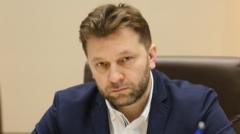Moldova is actively transforming its business landscape to attract foreign investment, especially in the face of ongoing political instability. Dutch entrepreneur Luc Vocks, who set up his business in Moldova in 2007, highlights the drastic evolution the country has undergone since he first arrived. Vocks established DevelopmentAid in Chisinau, now employing 180 people and facilitating job listings in the international development sector.
The Moldovan government is keen to lure more foreign entrepreneurs like Vocks, promoting an appealing tax environment. The corporate tax rate stands at a mere 12%, a stark contrast to the higher rates observed in the UK and the Netherlands, where Vocks initially launched his business. For technology firms, the incentives are even more enticing; the Moldova IT Park (MITP) offers a reduced tax rate of just 7%, significantly bolstering the nation's IT industry and encouraging international firms to consider relocating.
Amid efforts to modernize the economy, the Moldovan government is also navigating complex political dynamics. Following pro-European Union constitutional changes backed by a narrow 50.46% majority, President Maia Sandu's re-election signals a continued push towards EU integration by 2030. Yet, Russia's opposition to Moldova's EU aspirations remains a significant hurdle. Authorities claim Russian interference attempted to manipulate the election, drawing attention to ongoing geopolitical tensions affecting the region.
Deputy Prime Minister Dumitru Alaiba proudly cites Moldovan advancements in combating corruption, with notable improvements reflected in the global Corruption Perceptions Index. The shift from a highly corrupt nation to one recognized for reform is crucial for maintaining investor confidence. “Now entrepreneurs can breathe freely without fear of repercussion,” Alaiba states, contrasting with experiences from a decade past when foreign business operations faced arduous bureaucratic hurdles.
The MITP exemplifies Moldova's strategy to revitalize its economy, simplifying processes for foreign businesses while eliminating employer social security contributions. The initiative now boasts over 2,000 registered companies, contributing approximately 6% to Moldova's GDP. However, rising salaries due to foreign firm presence are prompting concerns about affordability, as smaller local enterprises struggle to compete for talent against lucrative offers from larger MITP-participating companies.
Despite positive trends, challenges persist. A significant number of Moldovan IT professionals still seek opportunities abroad, influenced, in part, by the neighboring conflict in Ukraine. Nonetheless, officials express optimism that support for Ukraine will ensure Moldova's stability.
Marina Bzovii, MITP's administrator, envisions Moldova as a central hub connecting businesses with regions beyond Europe. "Moldova is connecting even Central Asia... Chisinau is now really vibrant," she notes, highlighting the country’s potential for growth despite external pressures. As Moldova continues on its path toward economic improvement and foreign investment attraction, the coming years will test its resilience and global integration ambitions.





















